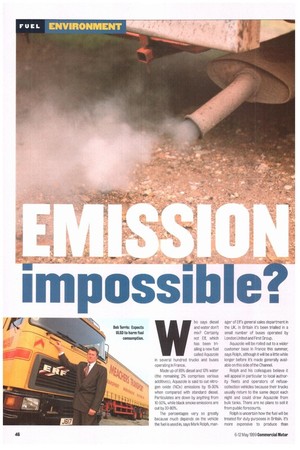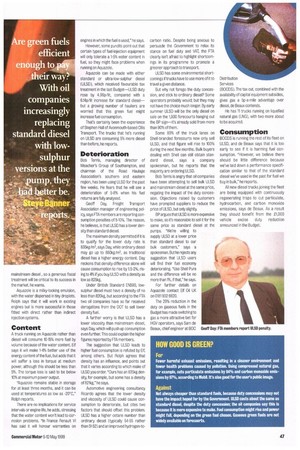iN ho says diesel and water don't mix? Certainly not
Page 48

Page 49

If you've noticed an error in this article please click here to report it so we can fix it.
Fir, which has been trailing a new fuel called Aquazole in several hundred trucks and buses operating in France.
Made up of 85% diesel and 13% water (the remaining 2% comprises various additives), Aquazole is said to cut nitrogen oxide (NIDx} emissions by 15-30% when compared with standard diesel. Particulates are down by anything from 10-50%, while black smoke emissions are Cut by 30-80%.
The percentages vary so greatly because much depends on the vehicle the fuel is used in, says Mark Rolph, man
ager of Elf's general sales department in the UK. In Britain it's been Walled in a small number of buses operated by London United and First Group.
Aquazole will be rolled out to a wider customer base in France this summer, says Rolph, although it will be a little while longer before it's made generally available on this side of the Channel.
Ralph and his colleagues believe it will appeal in particular to local authority fleets and operators of refusecollection vehicles because their trucks usually return to the same depot each night and could draw Aquazole from bulk tanks. There are no plans to sell it from public forecourts.
Rolph is uncertain how the fuel will be treated for duty purposes in Britain. It's more expensive to produce than mainstream diesel , so a generous fiscal treatment will be critical to its success in the market, he warns.
Aquazole is a milky-looking emulsion, with the water dispersed in tiny droplets. Rolph says that it will work in existing engines but is more successful in those fitted with direct rather than indirect injection systems.
Content
A truck running on Aquazole rather than diesel will consume 10-15% more fuel by volume because of the water content. Elf says it MI make 1-4% better use of the energy content of the fuel, but adds that it will suffer a loss in torque at medium power, although this should be less than 5%. The torque loss is said to be below 10% at maximum power output.
"Aquazole remains stable in storage for at least three months, and it can be used at temperatures as low as -20°C," Rolph reports.
There are no implications for service intervals or engine life, he adds, stressing that the water content won't lead to corrosion problems. "In France Renault VI has said it will honour warranties on engines in which the fuel is used," he says.
However, some pundits point out that certain types of fuel-iNection equipment will only tolerate a 1-6% water content in fuel, so they might face problems when running on Aquazole.
Aquazole can be made with either standard or ultra-low-sulphur diesel (ULSD), which received favourable tax treatment in the last Budget—ULSD duty rose by 4.96p/lit, compared with a 6.14p/lit increase for standard diesel— but a growing number of hauliers are worried that this green fuel might increase fuel consumption.
That's certainly been the experience of Stephen Hall of Avonmouth-based 011is Transport. The trucks that he's running on ULSD are consuming 5% more diesel than before, he reports.
Deterioration
Bob Terris, managing director of Meacher's Group of Southampton, and chairman of the Road Haulage Association's southern and eastern region, has been using ULSD for the past few weeks. He fears that he will see a deterioration of 5-8% when his fuel returns are fully analysed.
Geoff Day, Freight Transport Association manager of engineering policy, says FTA members are reporting consumption penalties of 5-10%. The reason, he believes, is that ULSD has a lower density than standard diesel.
The maximum density permitted if it is to qualify for the lower duty rate is 835kg/m3, says Day, while ordinary diesel may go up to 860kg/m3, as traditional diesel has a higher energy content. Day reckons that density difference alone will cause consumption to rise by 1.5-2%, rising to 4% if you buy ULSD with a density as low as 825kg.
Under British Standard EN590, lowsulphur diesel must have a density of no less than 820kg, but according to the FTA two oil companies have so far received derogations from the DDT to sell lower density fuel.
A further worry is that ULSD has a lower viscosity than mainstream diesel, says Day, which will push up consumption even further. This could explain the higher figures reported by FTA members.
The suggestion that ULSD leads to higher fuel consumption is refuted by Elf, among others. But Rolph agrees that density has an influence, and points out that it varies according to which make of ULSD you order. "Ours has an 835kg density, for example, but some has a density of 821kg," he says.
Automotive engineering consultancy Ricardo agrees that the lower density and viscosity of ULSD could cause consumption to deteriorate, but cites two factors that should offset this problem. ULSD has a higher cetane number than ordinary diesel (typically 54-55 rather than 51-52) and an improved hydrogen-to
carbon ratio. Despite being anxious to persuade the Government to relax its stance on fuel duty and VAT, the FA clearly isn't afraid to highlight shortcomings in its programme to promote a greener approach to transport.
ULSD has some environmental shortcomings if trucks have to use more of it to travel a given distance.
But why not forego the duty concession, and stick to ordinary diesel? Some operators probably would; but they may not have the choice much longer. By early summer ULSD will be the only diesel on sale on the 1.600 forecourts hanging out the BP sign—it's already sold from more than 90% of them.
Some 80% of the truck lanes on Shell-branded forecourts now only sell ULSD, and that figure will rise to 100% during the next few months. Bulk buyers dealing with Shell can still obtain standard diesel, says a company spokesman, but he reports that the majority are ordering ULSD.
Bob Terris is angry that oil companies have been attempting to sell bulk ULSD and mainstream diesel at the same price, negating the impact of the duty concession. Objections raised by customers have prompted suppliers to reduce the price of ULSD, but only slightly.
BP argues that ULSD is more expensive to make, so it's reasonable to sell it for the same price as standard diesel at the pumps. 'We're willing to supply ULSD at a lower price than standard diesel to our bulk customers," says a spokesman. But he rejects any suggestion that ULSD users will find their fuel economy deteriorating. "Use Shell Pura and the difference will be no more than 1%, if that," he says.
For further details on Aquazole contact Elf Oil UK on 01819028820.
The 29% reduction in the duty on gaseous fuels in the Budget has made switching to gas a more attractive bet for HGV operators, says Sam de Beaux, chief engineer at BOC
Distribution Services (BOCDS). The tax cut, combined with the availability of capital equipment subsidies, gives gas a Spa-mile advantage over diesel, de Beaux contends.
He has 11 trucks running on liquefied natural gas (LNG), with two more about to be acquired.
Consumption
BOCDS is running the rest of its fleet on ULSD, and de Beaux says that it is too early to see if it is harming fuel consumption. "However, we believe there should be little difference because we've laid down a performance specification similar to that of the standard diesel we've used in the past for fuel we buy in bulk," he reports.
All new diesel trucks joining the fleet are being equipped with continuously regenerating traps to cut particulate, hydrocarbon, and carbon monoxide emissions, says de Beaux. As a result they should benefit from the 11,000 vehicle excise duty reduction announced in the Budget.
HOW GOOD IS GREEN?
For
Fewer harmful exhaust emissions, resulting in a cleaner environment and fewer health problems caused by pollution. Using compressed natural gas, for example, cuts particulate emissions by 94% and carbon monoxide emissions by 97%, according to Mobil. It's also good for the user's public image.
Against
Not always cheaper than standard fuels, because duty concessions may not have the impact hoped for by the Government. ULSO costs about the same as standard diesel, despite the duty concession; the oil companies say this is because it is more expensive to make. Fuel consumption might rise and power might fall, depending on the green fuel chosen. Gaseous green fuels are not widely available on forecourts.












































































































